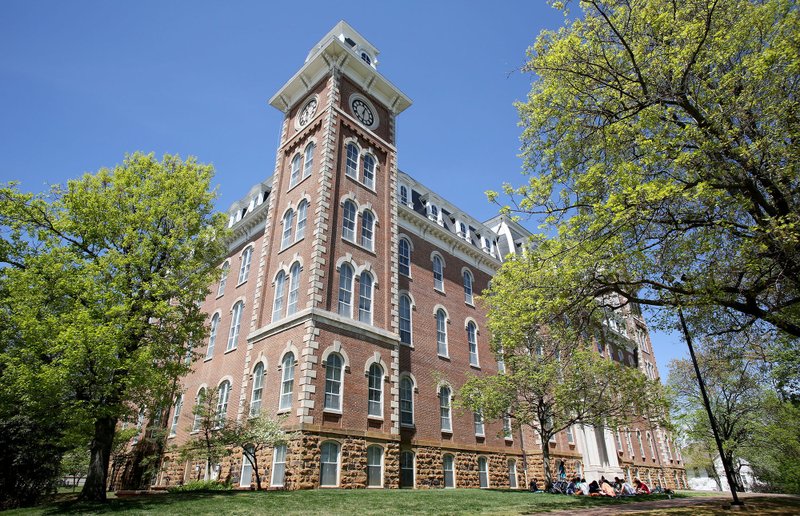FAYETTEVILLE -- Student requests to remotely attend a face-to-face or hybrid course this spring at the University of Arkansas, Fayetteville will generally be decided on by the faculty member teaching the class, UA's top academic official said Wednesday.
Provost Charles Robinson spoke about the topic in response to a question posed during a meeting of the university's faculty senate.
Top university leaders have called for an increase in face-to-face classes and in-person student attendance this spring.
Student leaders, however, have pushed back against potential attendance requirements in the spring as the pandemic continues. UA's Associated Student Government last month approved a resolution calling for spring class attendance requirements to be waived "solely based on personal safety concerns" of students.
On Wednesday -- well after Robinson's remarks -- UA's faculty senate voted to approve their own nonbinding resolution endorsing the student government request.
Dorothy Stephens, an English professor, said during the meeting that she supported the student resolution.
"I think if a student signs up for face-to-face and then the covid situation gets markedly worse during the semester, they should be able to change that without the professor's consent," Stephens said.
Many students have spent part of the fall semester in isolation because of covid-19 or in quarantine because of exposure to the coronavirus. There have been more than 2,100 active covid-19 cases tied to the campus, mostly among students, according to university data.
The university since the beginning of the semester has been recording classes and making materials available online to help students, allowing those isolating and others to participate remotely in classes designated as in-person or hybrid.
Along with this option, the university is offering a reduced number of in-person classes this fall -- at the semester's start, 2,733 out of 4,638 courses, or 59%, had shifted from in-person to remote delivery, a spokesman has said -- and the result has been far fewer students seen on campus.
Robinson said Wednesday that students this spring "can go remote by taking remote classes."
For others signed up for in-person or hybrid courses, some seeking to participate remotely may receive an accommodation from the university's disability resources and access center, Robinson said.
In other circumstances, "if the question is about taking a face-to-face or a hybrid course, and then choosing to be remote, that rests with the faculty, that is a faculty-driven decision," Robinson said. "It always is in a normal semester, and it will remain the right of the faculty to decide whether or not a student has to attend that class."
In October, Chancellor Joe Steinmetz, in an all-campus address, urged students to attend classes in person, stating that it is safe to do so despite the pandemic. Robinson, in an email to the campus Oct. 28, said that "to maximize engagement of students in the classroom, faculty may require in-person attendance for students enrolled in in-person courses, barring any health exemptions a student may have."
Last month, the University of Arkansas Board of Trustees approved a resolution calling for university and college leaders in the system to work with faculty to boost the number of classes with face-to-face instruction so long as it is safe to do so.
Before the Wednesday vote by UA faculty, some expressed concern about the student government's attendance resolution.
Garry McDonald, a clinical assistant professor of horticulture, said he was worried about laboratory classes where the aim is to give students hands-on experience.
This semester, "the labs have been a complete disaster," McDonald said.
"I certainly feel for the safety of the students, I mean, I'm very concerned myself," McDonald said. "Maybe we just need more, you know, more guidance and leadership from the [university] administration and, you know, the state on this."
Stephen Caldwell, chair of the faculty senate group and an associate professor in UA's Department of Music, said in the meeting that faculty members were told that for the fall semester they could not mandate that students show up in person.
Twenty-eight faculty senators voted to approve the resolution with five opposed, according to information provided by Caldwell after the meeting.
Faculty also voted to approve another resolution backing the "spirit" of a student government resolution about fall grades. The nonbinding resolution approved by faculty would automatically convert an "F" grade to "No Credit" as a way to keep from lowering a student's grade-point average. The resolution also would allow students to withdraw from a fall course after seeing their grade.
For this vote, 24 faculty senators voted to approve with 7 opposed.
John Post, a UA spokesman, said in an email Wednesday evening that the faculty resolutions and endorsements "will now be evaluated and considered.
"We're hopeful that final decisions on some of the resolutions can be made as early as the end of this week," Post said.
Julia Nall, president of the Associated Student Government and an international studies major from Bryant, in a text message said: "I understand that faculty have had an immensely difficult semester, and I appreciate the empathy that Faculty Senate is extending to students. We're grateful for their support."

